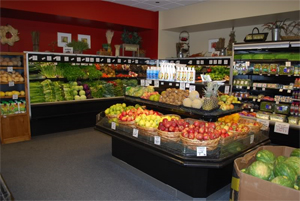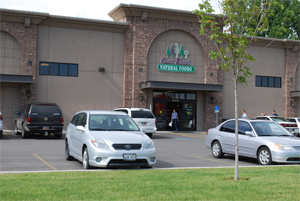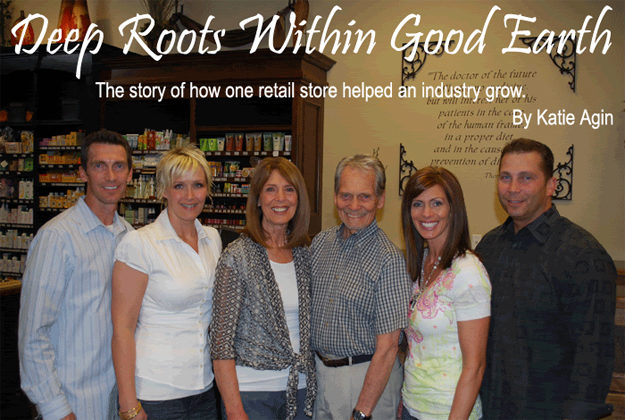"We have to remember the roots, the traditions of the natural health movement passed over time."
In October 1994, Congress passed the Dietary Supplement Health and Education Act (DSHEA). This momentous bill allows our industry to exist and gives people the freedom to choose natural health products. With this in mind, the retail stores we shop in and own are the means for this freedom to be executed, the places we go to care for our bodies and our families. Retail stores are the roots reaching back into history and the branches extending out into communities. They grow the natural products industry with a passion for healthcare second to none.
But one particular store, family-owned and -operated Good Earth Natural Foods, with locations throughout Utah, has a history of going above and beyond the norm. Its deep roots reach back to the 1970s, when the store was a hub of political activity that eventually helped launch DSHEA and propel the industry into the mainstream, all the while nurturing a growing family and community. We are proud to call Good Earth Natural Foods the WholeFoods Magazine 2009 Retailer of The Year.
From the Corner Store to Congress
Rarely do we think about the history behind DSHEA, the places and faces behind its existence, and Good Earth is one of those places. Good Earth Natural Foods was first opened in 1973 by Rae and Ken Howard, and Rae’s mother, Dr. Ann Geaslin. “Like so many other small stores at the time, we were devoted to natural healing and despite the dismal likelihood of success, Good Earth was opened,” says the family.
Not daunted by the enormity of the task and its implications, Rae took the bill to Senator Orrin Hatch (R-Utah) and effectively planted the seed for the natural products industry to grow.
Scott Howard, Rae’s son and a current general manager at Good Earth, says one of the themes his mother promoted is that one person can make a difference. “She went around the country and trained people how to do grassroots lobbying: how do you contact a representative, how do you get a hold of somebody and present concerns, how do you find out about pending and active legislation? She would send packets of information to legislators so they could read and be educated on these issues, so they had good information.” It was common for the family to see these items at home on the table; packets were stuffed and mailed out by their hands.
“Not just because of Rae,” Scott says humbly, “but because of many others like her, the grassroots response to Congress on that issue at the time was the largest grassroots response that had ever occurred in history. This industry was built on being able to contact someone and say ‘This is what I care about and this is what I want.’ And that’s what happened with DSHEA. There were leaders and Rae was one of those, but it was the result of many people throughout the country that made their voices heard."
|
Good Earth's Basic Values:
Focus: On individuals and on our purpose for being. Philosophy: Truth, quality and honesty. Passion: Making a difference, one person at a time. |
The store is now co-owned by Rae and Ken, their son Scott, their daughter Rachel, and Rachel’s husband, Todd Humphrey.
Rachel remembers being old enough for her and her brother to appreciate the role their parents played: “It was personal and business for us, because we knew our livelihood was in jeopardy as well,” she says.
She recalls the store’s “blackout day,” when they refused to sell supplements as a display of what life would be like under the FDA’s proposed rules at the time. Senator Hatch visited Good Earth for the demonstration and, with Rae, described the situation in front of television cameras. “It helped to make the statement that not only our business, but our way of living is on the line. I count it one of the greatest blessings in my life to know what we know, and to be able to treat myself and my family with the natural products that we do,” says Rachel. Although she fully advocates medical treatment for emergencies, she thinks not being able to give her family natural products would be “devastating.”
After DSHEA was passed, Rachel says, “It was an incredible moment. It was the middle of the night and Senator Hatch left Congress and called Rae—it was one of those amazing moments of triumph, where yes, this is the way it should be, but almost wasn’t.”
It is amazing to see the parallels between this family-run store educating the community—and Congress—at the same time, and emerging with a thriving business. “We understand our mission,” says Rachel, “And that is for every individual to gain optimum health of body and mind. This is done by providing them with fresh, wholesome foods, supplements and information.”
Growing Through The Years
A lot has changed since the 1970s and even the 1990s, but the family still remains quite active in various sectors of the industry. “With Rae and the Good Earth stores so heavily involved in DSHEA—and in other legislative initiatives as well (licensing for naturopathic physicians; protecting the rights of those in our industry to provide nutritional counseling; and expanding access to healthcare treatments and options for both providers and patients)—a sense of civic and community responsibility has been promoted in our stores,” says Rachel.
The Howards’ eldest daughter, Dallas Berg-Harris, also made her mark on the industry as an executive director of the then NNFA during the DSHEA years.
“Good Earth Natural Foods was opened because our commitment to health outweighed our business logic,” she continues. “Natural foods in the ‘70s was still considered in Utah to be very much a ‘hippie’ thing. We felt, however, that by teaching people one individual at a time, we could make a difference.”
Having worked there since they were kids, Rachel and Scott were eyewitnesses to the changes in the natural products industry.
They both remember some of the more awkward aspects of growing up in the business. “Dad promoted it any way he could. He put an A-frame sign on top of the family station wagon promoting the store and I asked to be dropped off a block away from the high school,” laughs Scott. Rachel too, remembers feeling ill at ease about being a vegetarian—although it had more to do with her childhood feelings about animals than natural health and nutrition at the time.
 But in the end, Scott says, “There was never any pressure to be in the business. It was an opportunity. We got to go to work.”
But in the end, Scott says, “There was never any pressure to be in the business. It was an opportunity. We got to go to work.”
And, attitudes about nutrition and health in general have definitely evolved, and Rachel is comfortably a vegetarian with her kids these days. Her husband Todd says, “It seems that many people who accessed natural foods from years past were driven there because they had health issues that were not responding to traditional medicine. There was a good segment where this is where they found their answers. There’s a general increase in awareness now. People are much more desirous of being healthy and they seek it out as a main focus or direction in life in order to maintain their health. So, it does stretch across a broad section of ages and demographics.”
Today, Rachel is the vice president of the company, and Todd, her husband whom she actually met in one of the stores, is the president. Scott is part of a general management team that includes Todd and Rachel and three others. They all stress, however, that these overly formal titles don’t truly capture their true team spirit about running the stores, which they go back and forth between regularly. “The three of us work together, we don’t go by the titles as much we are three general managers who work together,” she emphasizes.
They all agree, “It’s been a fun journey.”
Sowing the Seeds of Knowledge
It is obvious that the family’s political activism over the years has shaped their values in regards to how they run their business. Rachel believes that their small town and humble origins also helped shape Good Earth into the company it is today, and says, “We feel that educating customers is our highest priority,” she says.
“If you are the one who has a baby that has been on antibiotics for three months without any results; if you are the one who struggles with depression and anxiety; if you are the one who is battling cancer; if you are the one who has rheumatoid arthritis—receiving the help and education you need to start understanding your body and the role that foods and nutritional supplements play in that, is priceless,” Rachel continues.
Stemming from this philosophy is Good Earth’s staff of “wellness consultants.” The consultants are put through intensive training programs that involve “wellness packets” and tests to attain various levels of knowledge about products, ingredients and conditions. “We have continued to update and develop those and they range from teaching a wellness consultant what we could recommend for various illnesses, to what specific nutrients do.” The training program continues to evolve to keep up with the industry, and underscores the importance of continuous education. “Sometimes we call it “Good Earth University!” Rachel says. “Or at least that’s what we want to progress into. We have an excellent training program.”
Wellness consultants are available all hours, with at least three scheduled at any time. Appointments can be made, but customers are also welcome to walk in and meet with a counselor.
Also, says Scott, “We have monthly public seminars where representatives come in from various companies to educate the public and we have them focus on the education, as opposed to making a sales presentation on products.”
These seminars are open to general staff and community members. They often offer specials for those who come to the seminars, which are very well attended, and are even booked in advance.
In addition, the stores host monthly private seminars for their wellness consultants to give them specialized and focused training. Scott explains, “We have a private training session with [company] representatives and our staff where they can ask questions and learn about the health aspects of whatever products that company works with. These are reserved only for our wellness staff so they can have some one-on-one attention.”
To make knowledge even more available for everyone, each store maintains a wide selection of health books on various subjects and invites customers to “loiter and learn.” Tables and chairs are provided, creating mini-libraries, as well as a kids’ corner “to help entertain the little ones while parents study and shop,” says Rachel. Also, computer kiosks were added to the stores’ nutrition departments so customers can access the store Web site to look up illnesses, nutrients and products.
Overall, says Rae, “we established a tradition of personal service that really distinguishes our stores.”
The Good Earth Experience
Despite the company’s success and growth, “we have tried to keep the ‘hometown, family-owned’ feel,” says Rachel. The stores are set up like many retail stores with similar departments including fresh produce, health and beauty, books, dairy and so on. As an added feature, each store has a “bulk room,” a sectioned off area that is kept slightly cooler to keep bulk supplies fresher. Customers can scoop economical and ecologically friendly portions of grains, cereals and so on.
As with any store, however, the Internet can be viewed as a competitor, and getting customers to physically come in on a regular basis can be a concern for any storeowner. “Like most competitors, though, there is usually something to be gained,” says Rachel. “There will always be those that order online because of discounted prices, but I think most customers like the convenience of having a store they can come into. They can have products immediately, make a return if needed, and there are no shipping costs. A lot of products are perishable, which eliminates the likelihood of mail orders.”
 Another way to combat computer competition, says Rachel, is to have a good selection on hand at all times. Be aware that customers might be thinking: “If I have to wait, I might as well order it online.” She also recommends keeping aware of Internet prices, not necessarily to match them, but to keep in the same competitive range.
Another way to combat computer competition, says Rachel, is to have a good selection on hand at all times. Be aware that customers might be thinking: “If I have to wait, I might as well order it online.” She also recommends keeping aware of Internet prices, not necessarily to match them, but to keep in the same competitive range.
To make the stores even more inviting, the décor gives a warm and welcoming feeling. “We like to carpet our nutrition and HABA departments to make them cozy and entice customers to feel comfortable studying and shopping,” says Rachel. Additionally, skylights let in natural light, and the lighting has been updated keeping the environment in mind. Other environmental initiatives include reusable shopping bags and the possibility of a paper-free customer receipt emailing system in the future.
The Orem store has a café as well, where customers can relax and enjoy some fresh food or a shot of wheatgrass. As of now, the cafe is subleased to someone else who wants to expand, which Good Earth is excited about, as they would love to see “uniformity in the stores,” says Rachel.
How Good Earth Keeps Turning
Good Earth, which started as one small store, has multiplied and expanded over the years. The very first store opened in Provo, UT in 1973, which moved to a larger store in 1984 and then moved again in 1999. The Midvale store opened in 1989, moved in 1991, and then transferred to the town of Sandy in 2004. The Orem stored opened in 1996, followed by the Riverdale store in 2001 and American Fork after that. Each store, on average, spans 11,000 ft2 and the company employs a total of 300 employees. Most importantly, Scott says, “We’ve moved and expanded as we’ve felt we’ve been able to support our structure and have the quality that we wanted.”
Many retailers dream of having their businesses take off, of expanding, of educating communities and of making a difference. So, as a retailer, you may be asking yourself, how did they do it? The family offers some valuable advice about creating a retail success:
“First, be logical. Incorporate your passions as you can afford to,” advises Rachel. “You won’t be able to help anyone if you have gone out of business.” Indeed, every business starts out as a dream, as a vision of what is desired, but it takes time and patience for things worthwhile to come to fruition. Following this logic, make sure you start with enough capital. Don’t plan on “living off your business” for a year. As a result, you’ll be able to grow instead of using up your profits, says Rachel.
Next, treat your customers with sincere concern. “If you don’t care, they will know it and they will not be loyal to you,” cautions Rachel. In the fray of running a business from day-to-day, it can be easy to forget why the business was opened in the first place—to care for people, to improve their health and offer quality products. Those in it for the money alone with be easy to detect.
Becoming familiar with customers is important, too. Todd notes that women are a big category, and the 30–50 range are their best customers, but their spectrum of customers is vast. Learn about customers as a demographic of people, as well as the specific needs of each group and individual.
Also, when retailers know their customers, they can more accurately stock products based on demand in that particular region. Rachel says, “Our stores carry basically the same product mix, but there are small differences in actual products and what our customers need in that geographical location.”
Very importantly, put extra effort into being able to offer accurate information. “Pretending to know something doesn’t serve anyone well. Value comes from those who are willing to find out the answers,” says Rachel. Scott’s adds, “Everybody has strengths, be aware of those and use them. But find out where you’re not strong, too, and resource or source that out, and do something to improve your store.”
 Work hard. If you aren’t ready to work day and night to get things rolling, you are probably not ready to start a natural products store, warns Rachel. By the same token, be grateful for each day and each honestly earned dollar to feel fulfillment and satisfaction about your business. If running your store everyday feels like drudgery, you will most likely not succeed.
Work hard. If you aren’t ready to work day and night to get things rolling, you are probably not ready to start a natural products store, warns Rachel. By the same token, be grateful for each day and each honestly earned dollar to feel fulfillment and satisfaction about your business. If running your store everyday feels like drudgery, you will most likely not succeed.
Always treat vendors with honesty and respect, but also value your employees, and what they say, think and do. “Good Earth has been shaped by those tremendous people we work with. We don’t claim to be smart; we just hire great people. So, give credit where it is due!” says Rachel.
However, Scott emphasizes the importance of keeping business as business. He says, “We’re so happy that many people have said that working at our store has been the best job they’ve ever had, but that being said, business is business and you have to conduct it as such. There have to be core principles from the accounting to management. Good policies and procedures must be set up. If they are not, this can be one of the biggest downfalls for any small business.”
Above all, support the industry. “If it goes down, we all do,” says Rachel, echoing her mother, Rae Howard’s philosophies, “Fight for freedom to choose how you take care of your own body. When you fight for something, it becomes that much more precious.”
There’s A Lot More in Store
Today, Rae and Ken Howard, have stayed politically involved and help the industry to the best of their ability. “As time has gone on, they’ve moved more into the political arena as we’ve run the nuts and bolts of the business,” says Rachel. “They began [the business] and gave us the foundation and the belief system and started us on that path. They are very much a part of Good Earth even though they are not physically working in the business.” But even though they are not as directly involved in the family business anymore, “their hearts are still there.”
Ken Howard, who will turn 82 in September, has written several books and informational media on fluoridation, and dedicates a lot of resources to continuing education around the country, keeping two secretaries busy, five days a week.
Recently, the Howards’ eldest son, Michael, passed away. Rae remembers him as “an artist” who “added so much to the business.” Despite this heartache, this family is the kind that will never stop caring—whether about each other or the health of our industry and country.
With such a full and eventful past, what else could the future hold for Good Earth? Plenty. Rachel reveals there are plans to open a new store in the near future, and they are getting closer to making a decision on a location for that store. Also, the company has discussed plans to open approximately three new stores in the next five to six years.
The accomplishments of this family seem amazingly unbeknownst to them, and in most respects, they are just a regular family. When interviewed for this article, they were humble, kind and grateful, with the company’s “future president,” Scott’s son, Keaton, who is just two, babbling happily in the background.
And although Keaton may not know it yet, retailers today can appreciate the generations of his family before him that helped set the standards for generations ahead to have the freedom of choosing quality, natural healthcare. WF
Published in WholeFoods Magazine, August 2009









